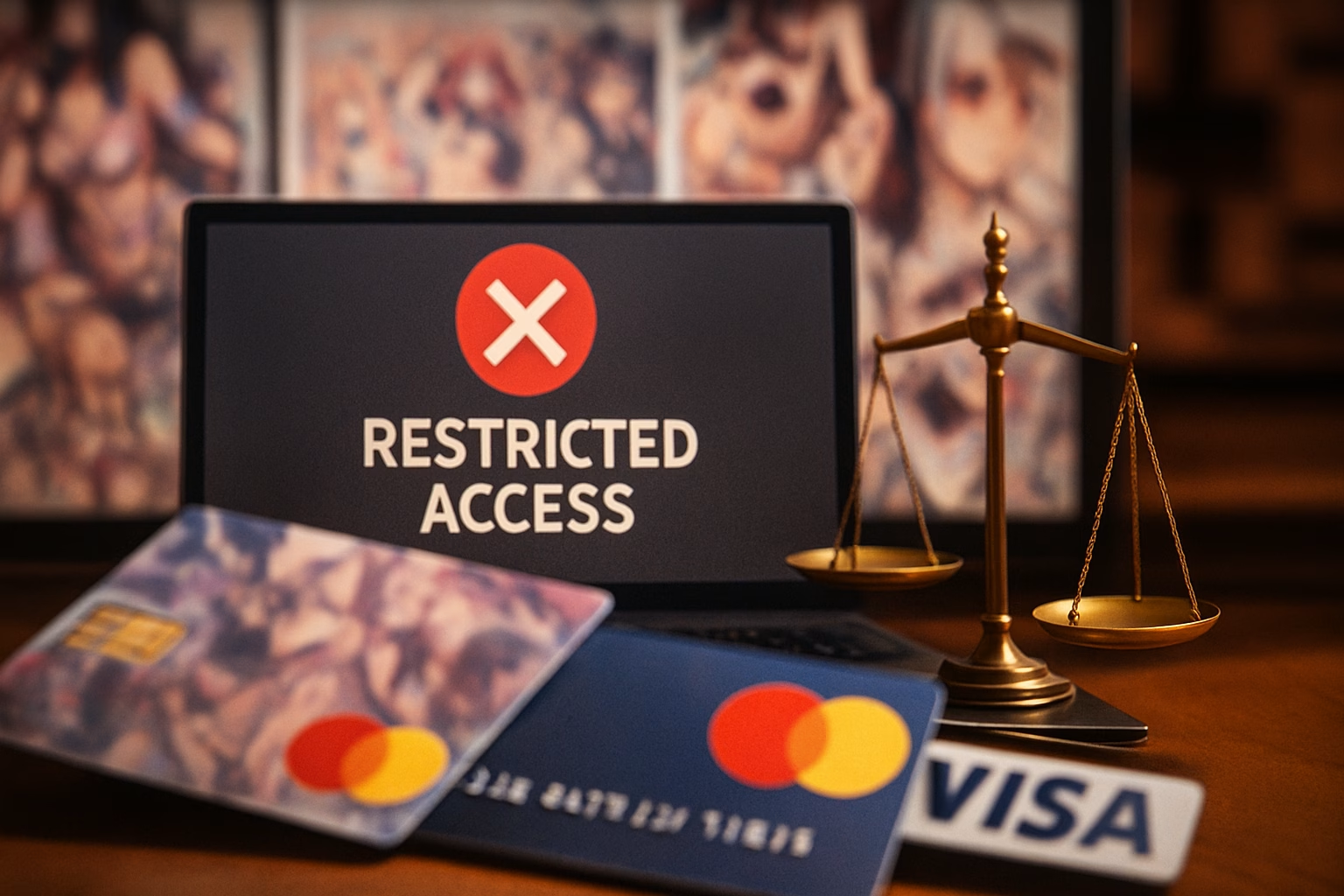Compliance & Regulatory
Balancing the Books: Payment Processors Flex Their Market Power by Limiting Adult Content

Table of Contents
The gaming industry faces an unprecedented challenge to its creative freedom from an unlikely source: credit card companies. In July 2025, both Steam and Itch.io succumbed to pressure from payment processors, implementing sweeping restrictions on adult content that have pulled thousands of games and left developers scrambling for answers. This corporate censorship raises legal questions about the role financial intermediaries play in content moderation, the boundaries of obscenity law, and the future of digital commerce.
The Catalyst: From Australia to Your Adult Gaming Library
The current dilemma traces back to anti-porn organization Collective Shout calling on all the major credit card companies to delist countless NSFW games from the popular gaming platforms. While initially focused on a particularly egregious title called “No Mercy” that depicted sexual violence and incest, the group’s campaign expanded to target “hundreds of other games featuring rape, incest and child sexual abuse” allegedly available for purchase on Steam and Itch.io.
What began as activism against genuinely problematic content has morphed into something far beyond the boundaries established by obscenity laws. Itch.io publicly announced that they have “deindexed all adult NSFW content” from their browse and search pages, affecting thousands of games, visual novels, and even tabletop RPG materials. The platform acknowledged that “the situation developed rapidly, and we had to act urgently to protect the platform’s core payment infrastructure.”
The Legal Landscape: When Private Companies Create Public Policy
Obscenity Law in the Digital Age
Under U.S. law, obscenity receives no First Amendment protection. The Supreme Court’s Miller test, established in Miller v. California, defines obscenity through three criteria: (1) Whether the average person sees the material as having/encouraging excessive sexual interest based on community standards, (2) Whether the material depicts or describes sexual conduct in a clearly offensive way as defined by the applicable state law, and (3) Whether the work, when considered in its entirety, “lacks serious literary, artistic, political, or scientific value.”
However, what’s happening with Steam and Itch.io goes far beyond enforcing existing obscenity law. Legal scholars writing in Fordham University’s Journal of Corporate and Financial Law have identified this phenomenon as “financial censorship,” while health and policy researchers Val Webber and Rébecca Suzanne Franco describe this as “definitional creep”—where private financial entities can effectively create “de facto global obscenity law that suits corporate rather than collective interests.”
The Payment Processor Functional Monopoly
An added legal concern stems from the functional duopoly that Visa and Mastercard maintain over digital payments. Anyone seeking to accept credit cards generally does so in accordance with the MATCH list, a mandatory system maintained by Mastercard but used across the payment industry by all the major credit card providers (like VISA and AMEX). This concentration of market power allows the major payment processors to impose pseudo-restrictions that effectively function as barriers for businesses, regardless of local legal frameworks.
While state legislation has a significant effect on the material lives of adult content creators, the terms of service of the US-based, privatized financial industry has a more immediate and widespread effect—one that crosses state lines. This creates a system where corporate policies override states’ rights and federal standards.
Third-Party Attribution and Liability
Gaming platforms find themselves in a precarious position regarding third-party content. While Section 230 of the Communications Decency Act generally protects hosting platforms from liability for user-generated content, payment processors operate outside of this established framework. They can threaten to withdraw services, forcing platforms to self-censor or face financial ruin.
This creates what legal scholars call a “censorship by proxy” system, where platforms must enforce vague and ever-changing standards set by financial institutions rather than clear legal guidelines. The lack of transparency in these decisions raises liability attribution and due process concerns, particularly when creators allege that they are being denied payouts without prior notice or opportunities to comply.
Maturity Ratings and Age Verification
The current system also disrupts established content rating systems. The gaming industry has long relied on the ESRB ratings system to provide age-appropriate content warnings. However, this current controversy shows how payment processor policies bypass these established systems, creating their own definitions of acceptable content.
Federal law already addresses concerns about minors accessing adult content online. It is illegal to knowingly use interactive computer services to display obscenity in a manner that makes it available to a minor less than 18 years of age under the Communications Decency Act of 1996. Therefore, what these payment processors are doing goes beyond established legal requirements.
The Broader Implications: Who Ends Up Paying?
This gaming censorship crisis represents a microcosm of larger concerns about financial censorship. Nier Automata director Yoko Taro claimed it’s “not just a matter of censoring adult content or jeopardizing freedom of expression, but rather a security hole that endangers democracy itself.” When payment processors can unilaterally decide what content can be monetized, they wield power traditionally reserved for courts and legislatures.
Legal scholars have proposed various solutions, from treating payment processors as common carriers to implementing non-discrimination requirements. A rule requiring payment processors to serve customers indiscriminately, however repugnant, would likely be welcomed by financial institutions themselves, as it would fully embrace the free market. But that must be balanced with protecting the public good and minors.
For the gaming industry and digital creators more broadly, this crisis demands both immediate practical responses—such as exploring alternative payment methods—and long-term legal advocacy. The question is not whether adult content deserves protection, but whether corporate payment processors should have the power to decide what legal content can exist in the digital marketplace.
As this situation evolves, stakeholders must engage with policymakers, legal advocates, and the broader gaming community to ensure that financial infrastructure serves commerce rather than censoring it. The alternative is a digital landscape where creativity is limited not by law or community standards, but by the risk management and compliance departments of international conglomerates.







